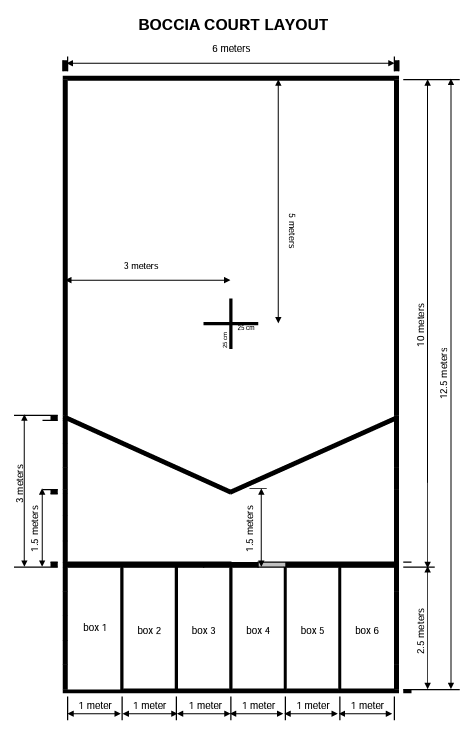Boccia is a sport for athletes who have extra needs including severe difficulties with their mental health, limited cognitive function or physical disability but can be played by anybody but it was designed for players with limited locomotor function. There is no Olympic equivalent to Boccia in that there is no discrimination between who can play Boccia however, depending on the severity of need, some players may be placed into different categories based on the extent to which they are affected by their disability, there are four different categories. It is a game that is played sitting down making it accessible to any player regardless of their disability.
It is a target sport, like curling or bowls, and is played indoors on a court of a similar size to a badminton court and uses soft leather balls and involves a lot of tactics, incredible amounts of skill and has lots of nail-biting tension! It is so easy for someone to get hooked playing Boccia whether they are physically able or differently-abled!
Rules of Boccia

The rules of Boccia are simple. The aim of the game is to get closer to the jack ball than any of your opponents. The jack is a white ball and is thrown first. These rules outline the basics of Boccia, but the full rule s
- Each side has six balls, so twelve balls are in play at any one time. One side has six red balls and the other has six blue balls. The balls don’t bounce but will roll.
- The side whose ball is not closest to the jack throws until they get a ball closest or until they run out of balls.
- If a ball is thrown and it doesn’t enter the court or lands outside of the court, the ball will be deemed out of bounds and taken out of play.
- Once all of the balls have been thrown, one side receives points for every ball they have closer to the jack than their opponent’s closest ball.
- If the Jack is knocked out of the playing area, or into the non-valid area for the Jack during the match, it is repositioned on the Cross.
- When throwing a ball, at least one button must remain in contact with the chair.
- If a ball in play rolls on its own, without being touched by anything, it will remain in the playing area in the new position.
- The game has six rounds (called “ends”) and the side with the most points at the end of the six ends wins the game. If a game ends in a tie break, an extra end will be played.
- Games can be played in teams, one vs one or in pairs. There are different rules relating to how opponents are pitted against each other and how pairs and teams are made up.
The full list of rules can be found on the Boccia UK website.
Classification
Players are divided into four different classifications based on their disability and how it affects their functional ability to play. All players have impared functional ability in all of their limbs. These classifications are outlined below:
- BC1 – Players with cerebral palsy who are able to use their hands or feet to propel a ball into play. Athletes in this category may have an aide on court to pass them their ball before each shot.
- BC2 – Players with cerebral palsy who are able to use their hands to propel a ball into play and who have greater functional ability than a BC1 athelete.
- Players with cerebral palsy or other disability with locomotor dysfunction in all limbs who are unable to throw or kick a ball into play and are permitted to use assistive devices, such as ramps or pushers, to propel the ball into play. These assistive devices may be supported by an assistant (‘ramper’).
- BC4 – Players who do not have cerebral palsy but have another disability with locomotor dysfunction in all of their limbs and have similar functional ability to BC2 athletes. Disability such as spastic paraplegia, muscular dystrophy and tetraplegia will fall under this classification.
Full details of each classification can be found on the Boccia UK website.
These classifications concern the playing of boccia at an Olympic level. Primarily, as a Paralympic sport, there are no classifications for able-bodied persons or people who aren’t living with a disability but that doesn’t mean people without disabilities or who are able-bodied can’t take part in the sport. On a non-Olympic level, the classifications may be mixed or altered to maintain an inclusive environment for the sport.
Get involved with Boccia with Active Future Leicester
We’re so pleased to be able to bring Boccia to Leicester and Leicestershire which is coached by experienced coaches with years of experience playing boccia. Register your interest using the form below and one of our team will get in touch:
[fc id=’11’ align=’center’][/fc]
After submitting the form, you’ll be redirected to our Facebook page after three seconds.